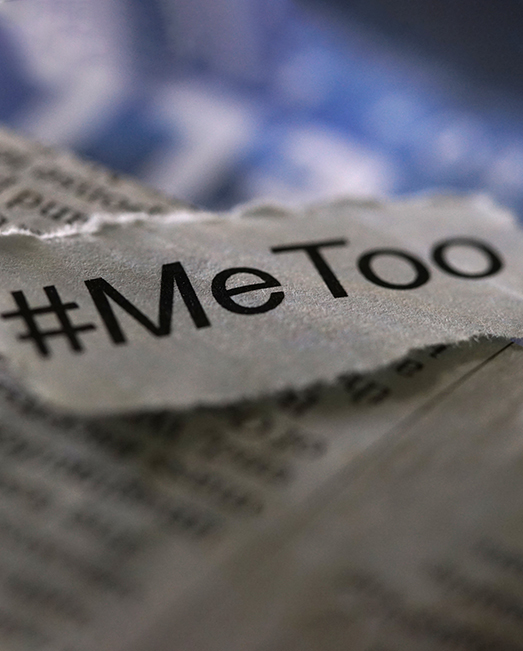Community
Copyright@ Australian Catholic University 1998-2026 | ABN 15 050 192 660 CRICOS registered provider: 00004G | PRV12008
Copyright@ Australian Catholic University 1998-2026 | ABN 15 050 192 660 CRICOS registered provider: 00004G | PRV12008

The #MeToo movement has signalled a huge shift in society’s attitude towards gendered violence. But employment rights expert Lisa Heap says deep cultural change is needed to tackle sexual harassment in Australian workplaces.
A young woman who is raped by her boss is warned she’ll “never get another job” in her field if she tells anyone what happened. She locks the memory of the assault away, “to keep myself safe”.
“I was terrified,” she says. “I did not tell anyone. Instead, I bought an airline ticket, put my car on a freight train and ran away to a small outback town.”
At a staff function in another workplace, a senior manager tells a female colleague he wants to “unlesbian” her. “He said he needed to show me what a real man was,” she says.
While initially too “frightened and ashamed” to speak out, she reports the incident to HR, and later resigns because she feels “unsafe and unsupported”.
These are just two cases amongst hundreds of submissions to the Australian Human Rights Commission’s National Inquiry into Sexual Harassment in Workplaces.
The AHRC investigation has been riding on the coattails of #MeToo — the online movement that focused global attention on gendered violence in the workplace.
When launching the inquiry in July 2018, Sex Discrimination Commissioner Kate Jenkins said the personal accounts that came to light through #MeToo had “made clear the devastating impact sexual harassment could have on individuals’ lives”.
“This spotlight on sexual harassment has turned the tide and created a clear and unprecedented appetite for change,” Ms Jenkins said.
As a veteran negotiator in workplace harassment cases, Professor Lisa Heap shares the Commissioner’s hopes that #MeToo has paved the way for change — but she believes the reality is a little more dispiriting.
She points out that previous movements and inquiries had done little to address sexual harassment at work, and in many cases, the very men who failed to act or turned a blind eye are still the ones in charge.
“Where we still have men in most of the leadership roles and key decision-making roles in organisations, where we have workplaces with hyper-masculine cultures and systems where aggressive, individualistic behaviours are rewarded, there is still going to be an issue,” said Heap, an Adjunct Professor at ACU’s Institute of Religion, Politics and Society.
“People might talk about it in a nicer way, but we are not seeing real progress because organisations are simply not changing the culture.”
The prevalence of workplace sexual harassment in Australia has increased in recent years, from 21 per cent in the AHRC’s 2012 survey to 33 per cent in 2018.
But despite that rise, most sexual harassment stays unreported in Australian workplaces, because victims often fear that speaking up could jeopardise their employment.
The AHRC’s latest survey results, released in September 2018, found only 17 per cent of those who experienced workplace harassment made a formal complaint.
As Professor Heap has pointed out before, the victims of verbal or physical abuse “have little faith in their workplaces to deal with it”.
“If you’re an employee and you’ve seen someone else go through the process, you know it’s completely brutal and usually ends up with the complainant facing ostracism, exclusion and ultimately leaving the workplace,” she told Impact. “So why on earth would you take that on?”
Those who made submissions to the national inquiry describe workplaces that are rife with sexism.

One woman detailed an incident where she was called over to the desk of a male colleague. “He showed me a magazine which displayed images of bestiality — of a woman having sex with a dog,” she said. “I was embarrassed and stunned … I never reported this as I knew it would not have been taken seriously or that I would have been considered a 'troublemaker'.”
Professor Heap has worked on cases where the sexist culture had become so entrenched that male employees had become “desensitised”.
“I’ve represented people in cases where groups of male professionals were routinely viewing and sharing pornography at work, and when questioned about the behaviour, the response is, ‘Oh come on, what’s the problem? Everyone is so ‘PC’ these days’,” she said.
“It starts with pornography and sexist jokes and then it progresses and somebody touches a colleague without consent, and often that’s seen as crossing a boundary, and people look back and say, ‘Okay, I can see how those things that didn’t seem so big at the time have contributed to this incident’.”
There’s another potential problem with #MeToo.
The fact that the extent of exploitative behaviour first came to light through a few high-profile cases in the entertainment industry — most notably Harvey Weinstein in the United States and Don Burke in Australia — may have undermined the fact that workplace harassment is a widespread problem in most sectors of work.
This, says Professor Heap, is #MeToo’s “double-edged sword”.
“MeToo is important because of the naming and shaming that’s occurred, but on the other hand, there is potential for people to think, ‘Well, it’s really awful that those nasty, powerful men are doing that in those glamour industries over there, but it doesn’t happen where I work’,” she said.
The statistics released by the AHRC tell a different story.
Workplace sexual harassment was high in industries like the arts, utilities, retail, mining, finance and insurance, accommodation, food services and education.
This may prove the problem is widespread and pervasive, but sexual harassment was far more likely to occur in the media, information and telecommunications industries, with 81 per cent of employees experiencing sexual harassment in the last five years.
“These are industries where the culture is a bit edgy, where historically a hyper-masculine, macho culture has permeated so sexism is more accepted than it is elsewhere,” Professor Heap said.
In March 2018, more than 30 high-profile women in the media and entertainment industries launched Now Australia, a campaign that aims to “tackle sexual harassment, abuse and assault in workplaces across Australia”.
Journalist Tracey Spicer, who spearheaded the project, said the movement had “got to the stage where we need more than the hashtag”. She told The Guardian: “We need practical solutions for an endemic problem.”
The first step to stemming the flow of workplace harassment is to recognise that the sexist attitudes that drive the behaviour “don’t stop at the factory gate or the office door”, Professor Heap said.
“Gendered violence in the workplace mirrors what occurs in society,” she said, adding that changing the structures, behaviours and attitudes that promote gender inequality — both in society and organisations — was vital.
“Workplace sexual harassment will only be addressed if organisations take responsibility and prevent predatory behaviour from happening in the first place,” she said.
“This requires organisations to accept that this behaviour exists and that it is preventable, to have an analysis on what factors are contributing to it — the behaviours and cultures that drive gendered violence — and then taking steps to remove those factors from the workplace.”
In her own submission to the AHRC inquiry, Professor Heap said current workplace laws “[reinforce] gender inequality [and] create the conditions in which gendered violence flourishes”.
She recommended the introduction of laws that make it a requirement for organisations to proactively engage in prevention.
Professor Lisa Heap is the former executive director of the Australian Institute of Employment Rights and a lawyer who has practiced in the areas of workplace and discrimination law. She is currently a member of ACU’s Institute of Religion, Politics and Society.
Copyright@ Australian Catholic University 1998-2026 | ABN 15 050 192 660 CRICOS registered provider: 00004G | PRV12008